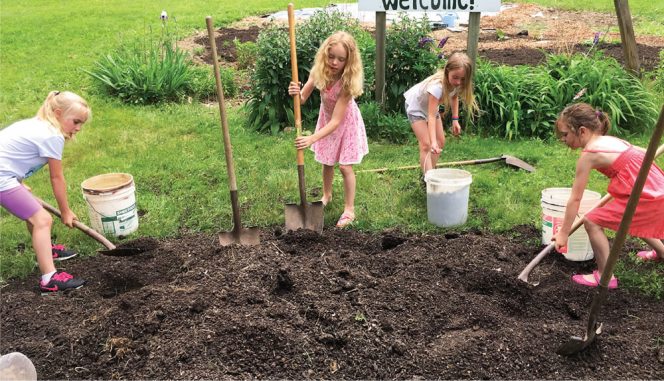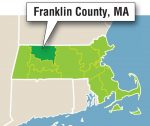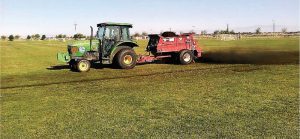BioCycle August 2018

Windham Solid Waste Management District (Brattleboro, Vermont), donated approximately 15 cubic yards of its “Brattlegrow” compost to six area schools for use in their vegetable gardens.
Brattleboro, Vermont: District donates compost to local schools
Over the past several months, Windham Solid Waste Management District donated approximately 15 cubic yards of its “Brattlegrow” compost to six area schools for use in their vegetable gardens. The compost is made from curbside-collected organics from Brattleboro’s residential program, as well as commercial and institutional sources of food scraps, leaves, grass clippings, and wood chips. The composting facility, operated by the District, recently acquired a new loader to mix the organic materials as they come into the facility and to turn the compost piles to accelerate decomposition. It has also been renting a screen to make three-eighth-inch compost as well as half-inch compost. The District sells bulk loads of compost to a number of distributors, including Boyd Family Farm in Wilmington; D&E Tree in Guilford; Maple Hill Nursery in Swanzey, (NH); and Renaud Tree Care in Dummerston. These distributors sell compost to retail customers.
Franklin County, Massachusetts: Source Separating Organics Soars In Schools
 The Franklin County Solid Waste Management District announced a milestone: 25 public schools in the county, including seven high schools, divert all food and paper waste from cafeterias and kitchens into composting programs. Students at all of these schools have been taught to separate trash and recyclables from leftover food and paper waste, in many cases reducing trash from cafeterias and kitchens by 80 percent. Three of the 25 schools have robust on-site composting programs. These are similar to home composting in that they do not compost animal products such as meat, bones, or dairy products. The finished compost from these on-site programs is used in school gardens.
The Franklin County Solid Waste Management District announced a milestone: 25 public schools in the county, including seven high schools, divert all food and paper waste from cafeterias and kitchens into composting programs. Students at all of these schools have been taught to separate trash and recyclables from leftover food and paper waste, in many cases reducing trash from cafeterias and kitchens by 80 percent. Three of the 25 schools have robust on-site composting programs. These are similar to home composting in that they do not compost animal products such as meat, bones, or dairy products. The finished compost from these on-site programs is used in school gardens.
At the other 22 public schools, all types of food and paper waste are sent to local commercial composting facilities: Martin’s Farm in Greenfield, Clear View Composting in Orange, or Bear Path Farm in Whaley. At over a dozen of these public schools, food and paper waste from classrooms is also separated for composting, including paper towels from hand washing. Many schools also have an on-site garden composting bin for hands-on educational composting of garden and yard waste. Over the past 11 years, the Solid Waste District staff has set up 30 worm composting bins in classrooms across the county.
Six public schools in Greenfield were awarded a $30,000 3-year “School Recycling Assistance” grant from the Massachusetts Department of Environmental Protection in 2016. The Solid Waste District was subcontracted to set up the Greenfield programs. “In all, students at 33 of 35 public schools in the county are taught to separate trash from food and paper waste,” notes Amy Donovan, FCSWMD Program Director. “Eight of these public schools send food waste to a pig or chicken farmer, and the rest divert to composting.”
San Antonio, Texas: Composting World Sailing Championship Organics

New Earth, a San Antonio-based industrial composting company, processed all the organic waste from the Youth Sailing World Championship, held in Corpus Christi, Texas, in July 2018.
Teresina, Brazil: Measuring Soil Bacteria After Repeated Compost Application
A team of Brazilian and Dutch researchers evaluated the soil microbial community after seven consecutive years of land application of composted tannery sludge (CTS) to the same site. Tannery sludge consists of solids, mostly organic, that settle out of wastewater created by the processing of raw animal hides into finished leather. In many countries, tannery sludge is categorized as hazardous mainly because it contains chromium, though in its trivalent form (hexavalent chromium is more toxic than trivalent chromium). In the U. S. and many European countries, tannery sludge has been deleted from the list of hazardous wastes. This has made composting an option for low-chrome sludge, especially for tanneries that convert semiprocessed hides/skins to finished leather.
In this study, researchers examined the soil on a site that had received 0, 2.75, 5.5, 11 and 22 tons of CTS per acre. Soil samples were collected at 75 days following application in the seventh year. The most abundant phyla were Actinobacteria, Proteobacteria, Firmicutes, and Chloroflexi. Six bacterial genera differed between amended and unamended soil. The abundance of Bacillus, Paenibacillus, Symbiobacterium, Clostridium, Microlunatus, and Actinomadura increased after application of CTS. Application of CTS on soil has both negative and positive effects on the bacterial communities: Negatively, it alters the bacterial diversity and community similarity; Positively, it permits selection of specific bacterial groups able to resist and biodegrade contaminants. The study will appear in the May issue of Geoderma.
Lancaster, California: Soccer Turf Rescue

Agromin, a compost manufacturer, and Waste Management of Antelope Valley (CA) are collaborating to rehabilitate the turf at the City of Lancaster’s James C. Gilly National Soccer Center, home to 35 premium soccer fields.
Easton, Pennsylvania: Farmers Market Launches Composting Program
The 266-year old Easton Farmers Market launched its Easton Compost Program in July, the city’s first residential composting initiative. City residents, and those willing to travel to the market, can pick up a 5-gallon bucket with an odor-controlling lid at the farmers market in Easton’s Centre Square. Once the bucket is filled, they can bring it to a drop-off station at the back of the market, which is open every Saturday from 9:00 AM to 1:00 PM (May-December). The food waste is weighed and tipped into a city truck before being transported to American Biosoils in Easton for composting. Once the program is further established, a bucket of compost will be provided in return for the food scraps contributions. “So far, the reaction and the response has been great,” Easton Market District Director Megan McBride told Lehigh Valley Live. “We gave out 150 buckets in the first two weeks. On our first collection day, we collected just shy of 300 pounds of food waste.” The program was funded by a $10,000 grant from the Lehigh Valley Community Foundation.










